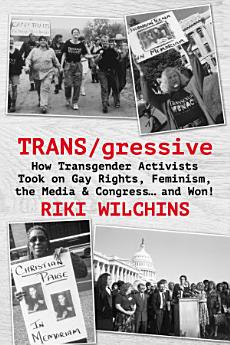TRANS/gressive: How Transgender Activists Took on Gay Rights, Feminism, the Media & Congress… and Won!
About this ebook
This was still a determinedly non-political population, often in defensive crouch because it was also constantly under attack by the media, police, local legislatures, feminists and even LGB-but-never-T advocates.
We were a group that still thought of ourselves as a collection of separate individuals, not a movement. What made political consciousness so difficult was that there was no “transgender section” of town, where we saw each other regularly.
And mainstream society mostly ignored us. And when it didn’t, it usually made clear it despised us. We were freaks. We were gendertrash.
We lived in a transient and indoor community that knew itself only a few days at a time during conferences at hotels out on the interstate.
But all that was about to change.
Even when politics are avoided, bringing despised and marginalized people together is itself a political act. Without realizing or intending it, the community was reaching critical mass.
Even in those pre-Internet, pre-cellphone days, enough transpeople were running into one another often enough to begin realizing we could be a force, that we didn’t really need cisgender acceptance. What we needed was our civil rights.
This is the inside story of how in just a few years, a handful of trans activists would come together in the face of enormous difficulties and opposition to launch from the very margins of society what would grow into the modern political movement for gender rights.
About the author
Riki Wilchins has been a leading advocate for gender rights and gender justice for 20 years, one of the founders of modern transgender political activism in the 1990s as well as one of its first theorists and chroniclers. In 1995 Riki launched Transexual [sic] Menace, the first national transgender street action group which spread to 41 cities. The following year they launched GenderPAC, the first national political advocacy group devoted to gender identity rights. Riki was an early supporter in the launch the intersex rights movement as well as the movement for alternative sexualities
They are the author of four books on gender theory and politics: Read My Lips: Sexual Subversion & the End of Gender; Queer Theory/Gender Theory; An Instant Primer; and Voice from Beyond the Sexual Binary, (with editors Claire Howell and Joan Nestle). Riki’s writing and research on gender norms have been published in periodicals like the Village Voice, GLQ, Research on Adolescence and Social Text as well as anthologies like Contemporary Debates in the Sociology of Education, Gender Violence, Feminist Frontiers, Language Awareness, Negotiating Ethical Challenges in Youth Research, Out at Work, Women on Women and The Encyclopedia of Identity. Riki has done trainings on gender norms and nonconformity at the White House, Centers for Disease Control and Office on Women’s Health. The New York Times has profiled Riki’s work; in 2001 Time Magazine selected them as one of “100 Civic Innovators for the 21st Century.” Riki is currently working on a book titled Gender Transformative Practice: A Guide for Funders, Policy-makers, Practitioners, Parents—and the Rest of Us.






